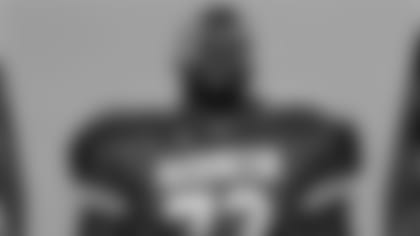The emptiness inside Sharrif Floyd was a hunger beyond his resolve.
In addition to needing sustenance, Floyd yearned for love, safety and the ability to trust as a child in North Philadelphia.
Seeing criminal activity on the sidewalks and witnessing domestic violence in his home was an acid that hollowed him.
"I watched my mom get abused growing up mentally and physically, so I knew what that was," Floyd said. "Seeing so much that you shouldn't see growing up can either help you or break you."
The disturbing cycle continued. No one ever told him, "Sorry you had to see that," or asked "Hey, are you OK?"
School wasn't much of a refuge in his early years. Floyd said he was bullied by peers and picked on by teachers.

"Self-esteem was low. I didn't really care to have friends because of my situation and didn't have the best of clothes," Floyd said. "I was in a bad situation as a child. Everybody there, certain people were cruel. I got picked on a lot, was probably one of the few who even got picked on by teachers."
Floyd found refuge in the arms of his mother's mother, Lucille Ryans, who understood young Sharrif's pain without asking. Born in 1943, Ms. Ryans was forced to drop out of school and pick cotton for pennies. The same hands were soft spots when Sharrif's smaller hands reached for comfort and connection.
Ms. Ryans' caring heart was accompanied by rocklike resolve.
"She was the caregiver because she already knew she had been through so much that the only thing on her heart was to care," Floyd said. "The only thing God told her to do was care."
Although he had support from the lady he calls "Ma," Floyd said genuine people were few and far between for much of his formative years.
"One, maybe two, three if there was a unicorn" of people around him who genuinely cared.
Floyd's teetering ability to trust was shattered when he learned as a teenager that the man he had seen abuse his mother, wasn't his biological father and that his biological father had been killed.
Meeting needs

The shocking news created a void more powerful than the physical hunger Floyd experienced when he ventured on his own at age 16.
Lunches often were sneaked from a trash can.
Floyd shoveled snow and pumped gas, collecting a few dollars for intense labor, or loose change, maybe even a buck per gas tank, in order to earn enough for that night's cheesesteak.
"There's ways to get what you need in life without going the wrong route," Floyd said. "You've got to know what you need in life, as opposed to what you want in life because those are two completely different things. One of those things can hurt you extremely. I don't need the next pair of Js [Jordan shoes] right now, but I do need that sandwich because I've got no energy. I do need this coat because winter is coming fast. It's just prioritizing at a young age. That's just what became of me."
The need to survive, fulfill needs and obtain wants can pull people into adverse or illegal means of acquiring items, but Floyd wasn't tempted by that route.
"It's easy to get caught up in the wrong situation at any given time," Greg Garrett, a friend and mentor, told Vikings: Beyond the Gridiron, "especially when you don't have a lot, especially when there's not a lot of positive role models."
Finding football
Floyd's first exposure to football — a hardscrabble version on a playground during his youth — sent him back to a basketball court.

"We played tackle football at a playground around the corner from our house where you throw the football up and you catch it and everybody gets a chance to hit you from end to end," Floyd recalled. "You can go as many times as you want until you throw it up in the air and the next person goes. The first time I did it, my head hit the ground first, so I got out of football quick and kept playing basketball."
Floyd was still good on the hardwood, but Coach Michael Edwards saw a defensive lineman in the making.
"Coach Edwards came and said, 'Sharrif, I love you. You know that. Please leave basketball alone and keep playing football,' " Floyd said. "I didn't know the extremeness of it until he said that."
Floyd arrived at George Washington High School with as an unlit candle. The belief that others placed in him on and off the field lit the wick. He's kept that flame burning.
"The first time I experienced trust was when I walked into high school," Floyd said. "Coach Ron Cohen came to me and said, 'Sharrif, if you listen to everything I tell you, to what I have to say, you will go to college and not have to worry about paying for your education.' That's his exact words. I looked that man in his eyes and said, 'OK.' Whatever you need, I'm in."
By the second year, he was one of the leaders on the team and helped the Eagles win their first of three city championships in a row.
"He was different. It was more than just a football game to him," Garrett said. "You could tell it was a passion, a lifestyle. It was everything. Of course, with everything he had going on in his personal life, football was his way to get away from everything. He understood if he did what he needed to do it would change his lifestyle.
Floyd began garnering national attention from colleges and an invitation to the U.S. Army All-American Bowl. Guidance counselor Dawn Reed-Seeger organized brownie bake sales to help Floyd afford the trip.
A young man once cornered in an alley found avenues of options. He narrowed them down to Ohio State and Florida and opted to become a Gator even though he said he didn't think Urban Meyer would remain at the school during all of Floyd's collegiate career.
"I just felt comfort in myself, not a coach, a player, anything like that," Floyd said. "I chose the University over everything because I enjoyed being a Gator. Even now that I'm not a Gator on the field or on film, I'm still a Gator at heart, because I chose the University not Coach Meyer.
"I still love him, and after he left, I said I'd still play for him," Floyd said. "It's not about the decision he makes. It's about the type of person he is. I think he's a good person. I will play for him any day. He's in that category with Mike Zimmer and Will Muschamp, my three favorite coaches because of the passion they bring to the game."
Friend and father
While at Florida, Kevin Lahn, a friend and mentor who developed a relationship with Floyd in Philadelphia became his adoptive father. Floyd said Lahn began as a friend, before being elevated to great friend to mentor status.
"Throwing that word, mentor, around is a hard word to say because you've got to trust in somebody to do that," Floyd said. "Trust wasn't a heavy word that I used on my side of the field because I never had it, I never needed it. It was never an option.
"He's Jewish and a Caucasian, and I'm from the ghetto, the hood. I don't really see that a lot," Floyd said of the way Lahn has invested in others.

Lahn has helped other young people who faced adverse circumstances. He said Floyd's challenges "must have made him really miserable, but at the same time, I think it made him more focused on being a better football player, a better student and being a better person."
Floyd has been able to receive that love and pass it along now that he's become a father and develop in the family atmosphere that exists between Vikings teammates.
"We preach family so much in our locker room, that that's what it is," Floyd said. "It's a family, and you can't win without being on the same page. You can't win without your brother being next to you.
"As a three technique, I can get off the ball faster than anybody in the world, but if [Everson Griffen] doesn't come off that edge, it means nothing because the tackle is on me," Floyd said. "If Linval [Joseph] doesn't go into that center, it means nothing because the backers can't come downhill and make their play. There's trust involved in everything because that guy next to me and behind me have to believe I'm going to get it done for the better."
Defensive line coach Andre Patterson said Floyd has the potential to add his name to the great tradition of Vikings three techniques, "from Keith Millard to John Randle to Kevin Williams."
"Sharrif has the talent to be one of those guys someday if he keeps coming," Patterson said. "Powerful, strong, explosive, but he has the quickness of a little guy, even though he's a big man. He just has to keep growing with his game. I'm expecting big things from him."
General Manager Rick Spielman leads the Vikings personnel department's comprehensive evaluation of prospects each season, taking a look at physical talent, mental toughness and character.

"(With) all the adversity he had to overcome, for him to come out on top of that, you know he has potential to be a very good football player for you because he takes that same approach, that same mentality when he's on the field," Spielman said.
Lahn said Floyd's athletic talents were obvious, but they didn't cover up the fact that he's a "special person."
"We knew he was special athletically, but we also knew he was a special person," Lahn said. "Regardless of athletics, he's a natural leader and is going to be someone special after football is over. Football is not going to be the end of his career. It's going to be the beginning of the next career for him."
Floyd is grateful for what the game has done for him and the way it has created opportunities to inspire youth facing similar circumstances and help them discover and pursue their dreams.
"This game not only saved my life, this game gave me hope, this game is what turned me around because in eighth grade, before I started playing football, I didn't know who I was going to be in life," Floyd said. "I didn't know what the 'Big Guy' had in store for me.
"I'm not a product of my environment. I'm more so the opposite," Floyd said. "I'm what it should be for every kid coming out of Philadelphia. I feel like I can be that guy that goes back and says it's more than just this, it's more than just a bad situation, it's more than I don't have parents, I don't have a mom. Those things matter down the line, but you still control your life and what you do on the daily, so 'Who do you want to be as a person?' "













